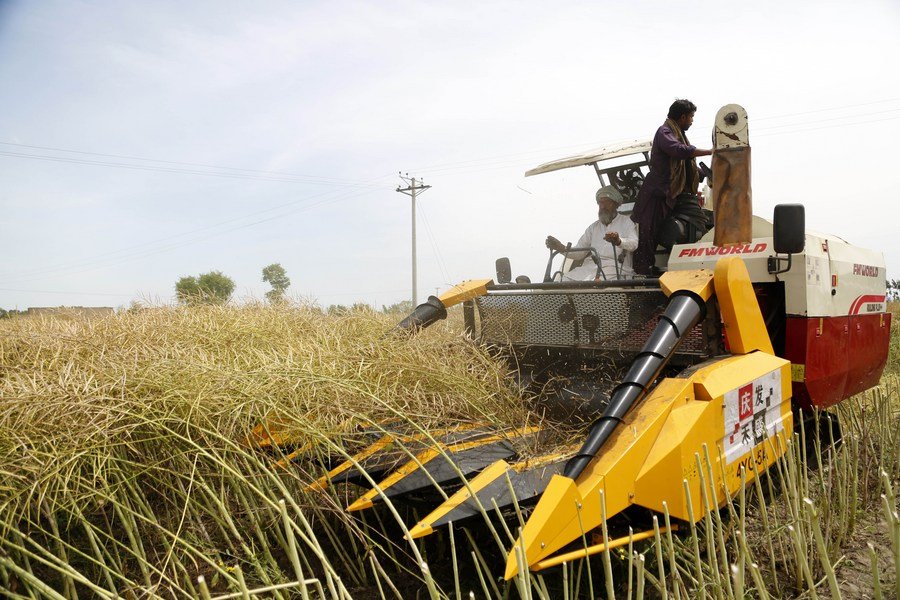In Pakistan’s eastern Bhakkar district, farmers were left in awe as they witnessed the newly imported oilseed harvesters from China efficiently and briskly carrying out their tasks.
In Pakistan’s eastern Bhakkar district, farmers were left in awe as they witnessed the newly imported oilseed harvesters from China efficiently and briskly carrying out their tasks. The introduction of these sophisticated machines marks a significant step forward in Pakistan’s agricultural landscape.
Muhammad Masood, a local farmer, expressed his amazement, stating, “In Pakistan, we lose up to 40 percent of our crop due to our reliance on a single type of harvester used for harvesting all crops including wheat, oilseeds, and others, so seeing such a sophisticated machine specifically designed for oilseed harvesting is truly fascinating.”
Pakistan, heavily reliant on imports for approximately 89 percent of its edible oil needs, spends a staggering 3.6 billion U.S. dollars annually to meet the demand of around 5 million tons. This dependency has led to challenges, including the unavailability of good quality oil seeds in the local market, pushing many towards cheaper but unhealthy alternatives like mustard oil.
However, the tide is turning with the introduction of Chinese canola variety into the market under Pakistan-China cooperation. This partnership, stemming from the China-Pakistan Economic Corridor (CPEC), aims to bolster various sectors including agriculture.
In 2022, Chinese company Wuhan Qingfa Hesheng Seed Co. Ltd. and Pakistani company Evyol Group joined hands to enhance Pakistan’s self-sufficiency in edible oil production. The collaboration began with the provision of high-quality hybrid seeds for cultivation, leading to increased per acre yield and offering a healthier alternative to locals.
Ghazanfar Ali, head of marketing at Evyol Group, highlighted the ongoing efforts to transfer technology from China to Pakistan. The recent import of oilseed harvesters from China signifies a leap towards smart agriculture practices in the country, with plans underway for further advancements including oil-extracting machines.
Zhou Xusheng, director of Wuhan Qingfa Hesheng Seed company’s international business department, elaborated on the capabilities of the new harvesters. These machines, tailored to local cultivation and usage habits, significantly reduce harvest loss and can boost yields by 20 to 30 percent.
Ali emphasized the customization of these harvesters according to local requirements, reflecting CPEC‘s commitment to uplifting socio-economic standards by empowering farmers with advanced technology.
Akmal Siddiq, technical advisor at Pakistan’s Ministry of National Food Security and Research, underscored the transformative potential of Chinese agricultural technology. By modernizing the oilseed harvesting landscape, Pakistan’s agricultural sector can overcome longstanding challenges, boost productivity, and enhance food security and economic development.
The adoption of these advanced technologies not only streamlines operations but also addresses labor shortages and inefficiencies during the harvest season. Through effective technology transfer and adoption, Pakistan’s agricultural sector is poised for a significant transformation, paving the way for a more prosperous and sustainable future.
